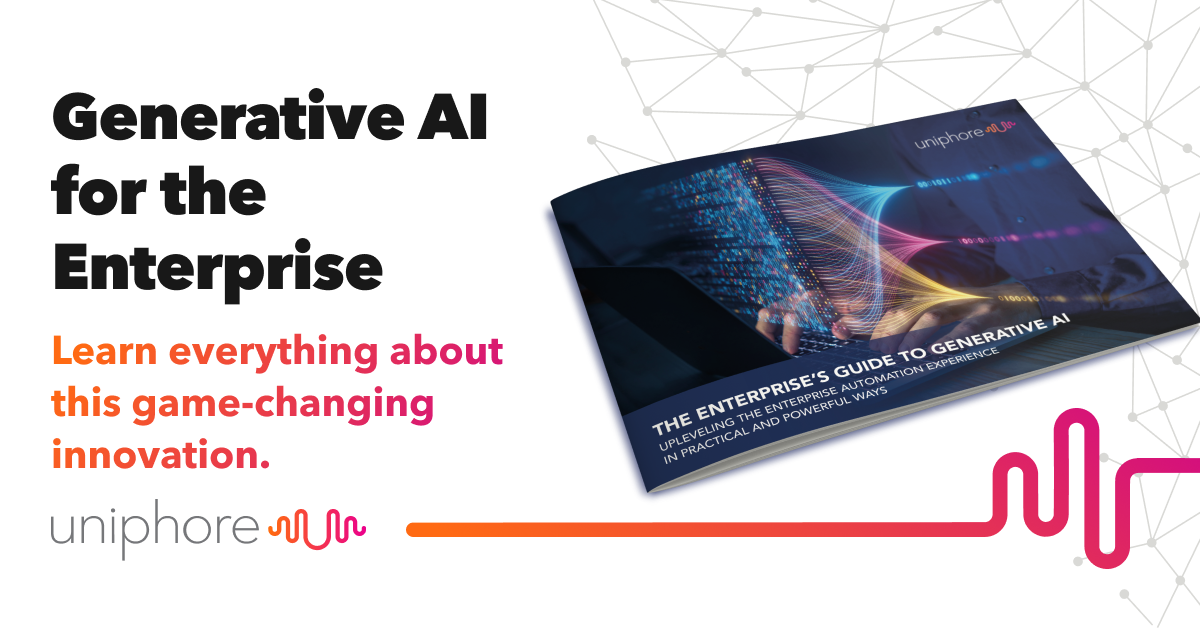Artificial intelligence (AI) has long been the subject of debates, theories and fantasies. Discussions around the future of AI commonly focus on the technology’s ability to create a better future by enabling smarter buildings, communities, healthcare and transportation. However, alongside these many positives come concerns around cybersecurity, data abuse, job losses, technology dependence and machines surpassing human intelligence.
We took the opportunity to discuss the future of AI as Patrick Ehlen, our Vice President of AI, sat down with Hayley Sutherland, senior research analyst of AI at market intelligence firm International Data Corporation (IDC).
Uniphore is hiring! View our job openings and apply today.
Advancements in Artificial Intelligence
As AI evolves in maturity, it presents new opportunities for individuals and organizations alike. Significant recent advances in AI include:
Natural Language Processing (NLP)
Conversational AI systems are increasingly capable of comprehending context and intent in natural language. These advances are helping machines fully understand what a human means and the context behind what they say.
According to Hayley, an excellent example of this is described in the Bidirectional Encoder Representations from Transformers (BERT) paper, published by a Google team led by Jacob Devlin in 2018. The paper caused a stir when it suggested language models with bidirectional training can gain a more profound sense of language context.
BERT uses transformer architecture, which learns contextual relations between words and reads entire sequences of words simultaneously as opposed to the traditional process of reading sequentially. This enables the model to understand the context of words based on their entire surroundings.
Hayley also explained that IDC has researched how businesses have changed and are responding to the pandemic. One of the most significant findings was that the number one investment organizations were prioritizing to support contactless experiences was voice-based interfaces.
Machine Learning and Deep Learning
Advances in machine learning and deep learning are reducing the time and resources required to complete complex tasks. These models teach machines how to perform tasks by showing them examples, and as their capabilities evolve, technology becomes more accessible and accurate.
Challenges Surrounding AI
Despite these positives, AI continues to be burdened by challenges and common misconceptions. These include:
People’s Attitude Towards AI
One of the biggest challenges AI needs to overcome is people’s attitude towards the technology. For example, Uniphore’s 2020 CX survey found three-quarters of people (76%) still prefer to speak with a live agent rather than an interactive voice response (IVR) or smart AI system. Furthermore, just one-third (32%) feel comfortable using AI in the customer experience process.
To address this, it’s crucial to not only advise people on the benefits of AI but also educate them on what it doesn’t do. For example, it’s not a self-aware entity that’s set to take over the world and steal people’s information, as can be seen with systems like Skynet in dystopian Hollywood movies. AI isn’t about taking jobs or replacing people, but rather augmenting peoples’ abilities to do manual tasks or make their job easier.
This differentiation will become more critical as digital assistants proliferate the consumer and enterprise worlds. As Hayley stated, as humans and machines work together more often, the technology will start to feel more normal. As a result, fear of AI will be replaced by excitement about no longer having to carry out manual tasks.
AI Still Lagging When It Comes to Understanding Context and Intent
A key reason for the reluctance to fully embrace AI is the technology’s inability to understand the context of conversations. However, Hayley explained that the focus on emotion AI or affective computing is seeing AI make positive steps in understanding human emotions. This will help conversational systems show empathy towards frustrated customers and offer a more considerate service to someone taking out an insurance claim following a highly emotional event, for example.
The move towards smarter AI is highlighted by Uniphore’s recent acquisition of video and emotion AI company Emotion Research Lab, which uses AI and machine learning to identify emotion and engagement levels in real-time video interactions. Combining this with Uniphore’s real-time voice conversation AI capabilities will help drive new applications and experiences, which, in turn, will produce better results across critical business areas.
Vision of the Future for AI
According to Patrick, understanding emotion and interpreting video data separately is the first step towards smarter AI, and both are already in progress. The real future of AI will be integrating speech and facial expressions to understand the entire context of humanity and our society.
Hayley sees AI becoming more pervasive in the next few years, assisted by organizations embracing more models. For example, IDC’s Futurescapes predicts that by 2022, at least 65% of Forbes Global 2000 companies will be using NLP, machine learning and deep learning business-wide. These models will enable use cases like automating tasks and answering questions across functions like customer service, human resources and procurement.
AI appears even more exciting the further we look into the future. Hayley says she is “constantly surprised and amazed” by the new models and methods emerging from the AI research world. And, while we remain a long way from what Hayley describes as “all-thinking, all-knowing, context-switching” technology, sophistication is set to improve rapidly over the next five years.
Indeed, IDC predicts that 20% of AI will be closer to artificial general intelligence by 2026. This means that AI will be capable of true reasoning, human-like logical leaps and piecing together multiple pieces of information from different sources to arrive at a complete answer. As a result, conversational AI will dramatically improve processes like answering questions, task automation and worker augmentation.
To learn what AI can do for your business, connect with a Uniphore expert today.
